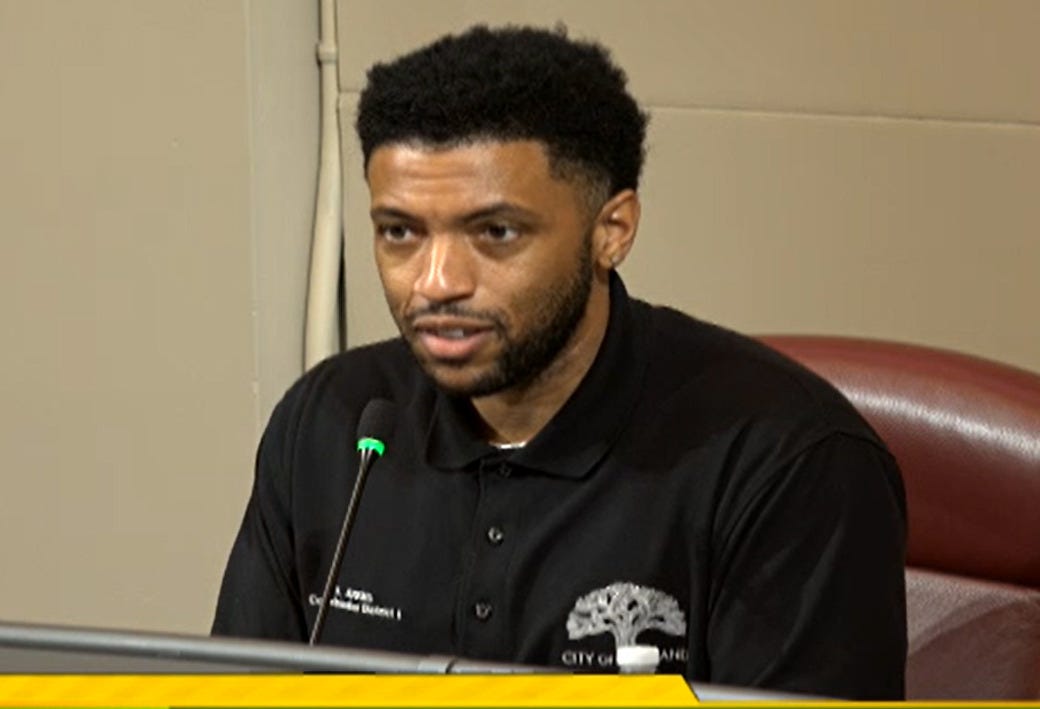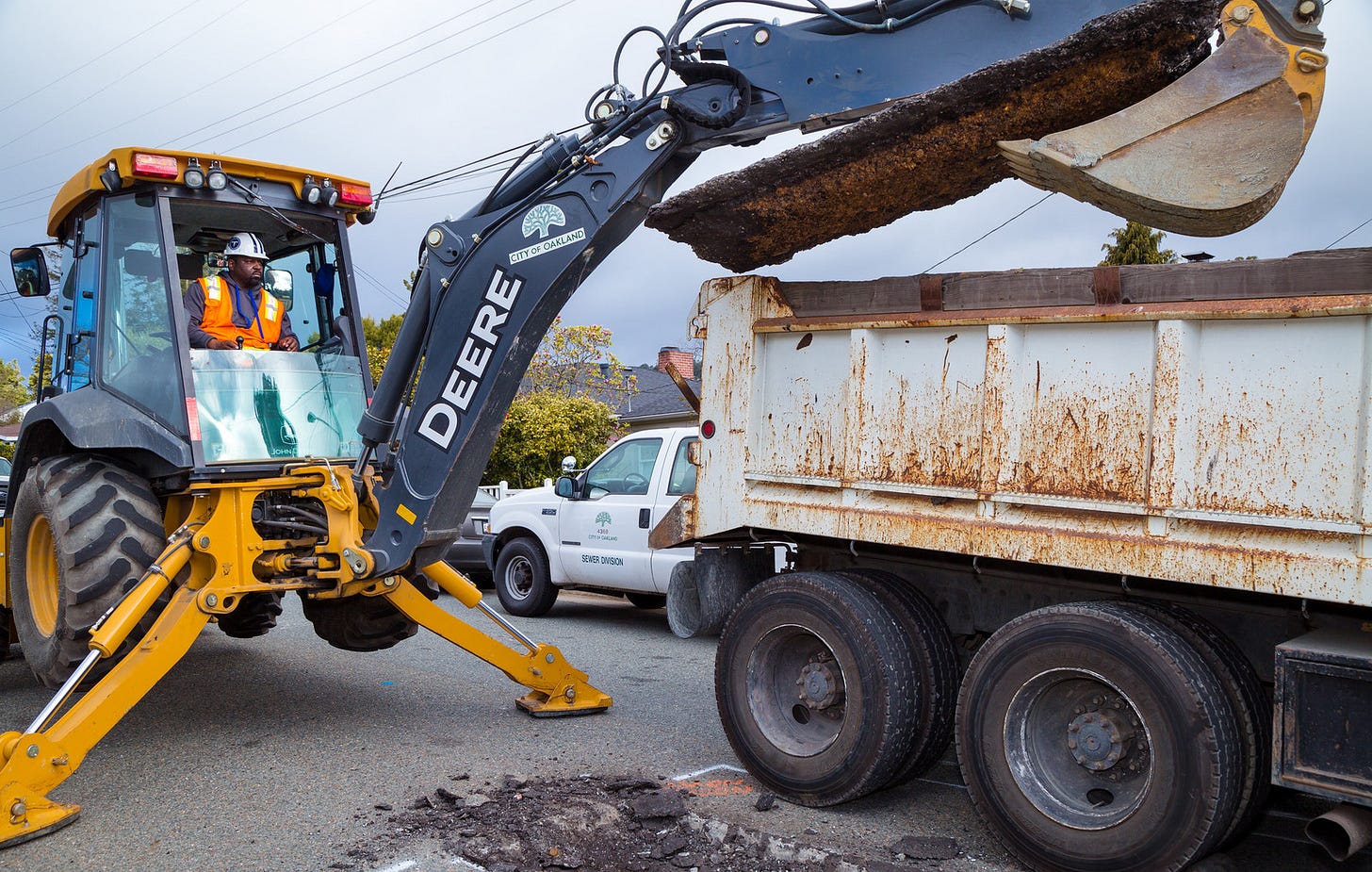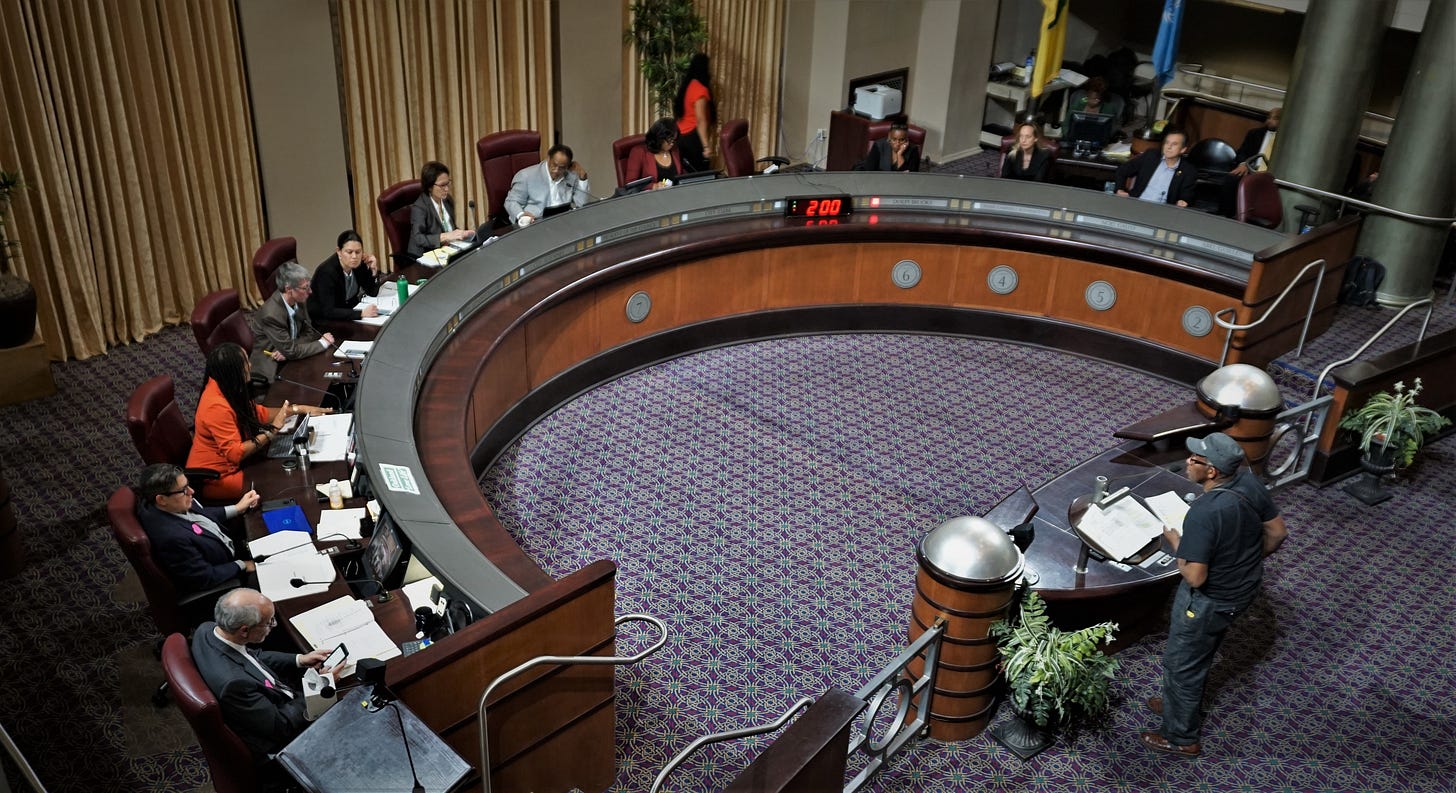Oakland can’t sell infrastructure bonds approved by voters due to fiscal mismanagement, Grand Jury reports
City of Oakland responds to Grand Jury report that cites "stunning failures" of governance

The City of Oakland’s reputation for chronic dysfunction prompted an Alameda County Grand Jury investigation and report released in June, and its conclusions are grim: the city has committed “stunning” failures in multiple areas of governance – a finding supported by extensive research, evidence, empirical data and sworn testimony.1
The grand jury report confirms that the city is in dire financial straits, perhaps even more than previously known or revealed. The report also finds that the city’s poor financial governance has disrupted its ability to issue infrastructure bonds – an essential municipal function – and that the city may be unable to secure financing for critically needed infrastructure projects, like street repaving, that were promised to Oakland voters in exchange for tax increases made to pay for the work.
The city council is set to discuss its formal response to the grand jury report at the special council meeting at 9:00 a.m. on Tuesday, November 4. Included with the meeting materials are responses to the grand jury’s findings and recommendations from the city administrator and the city auditor. These appear intended to serve as the raw material for the city council to craft its formal response to the grand jury.
City’s response to the grand jury report is overdue. An extension was granted
Formal responses to the grand jury report were due 90 days after the report’s public release, which in this case meant by the end of September. The city missed that deadline, and requested an extension to November 7 to submit its formal response.
An “unusually high number of complaints”
The Alameda County Grand Jury reports that it received “an unusually high number of complaints concerning the City of Oakland.”2 The number of complaints and the “significance of the issues” with the City of Oakland led the grand jury to focus the bulk of its investigatory attention on Oakland during its 2024-25 session.
The grand jury’s findings are “troubling”3 and “disturbing,”4 and raise serious concerns about the city’s mismanagement of its finances, infrastructure projects, and taxpayer-funded bond issuances, including:
A “disturbing disconnect” exists between city staff and city council on the severity of the city’s financial challenges.
The city’s fiscal mismanagement has disrupted the city’s ability to sell infrastructure bonds that are critical for fulfilling promises the city made to Oakland voters and taxpayers.
Despite voters approving two “enormous” tax increases to fix streets, Oakland has fallen behind on the work.
The city also has failed to effectively oversee how the taxpayer-financed bond funds are spent, and neglected its responsibility to ensure effective citizen oversight of those funds.
The grand jury also investigated other issues of concern, including poor stewardship of Measure Q park funds, the city’s practice of issuing parking tickets to stolen cars, and neglecting wildfire preparedness goals.
A “disturbing disconnect” between city finance staff and elected officials on the true extent of Oakland’s budget challenges
The grand jury report’s executive summary describes this finding as well as any summary we could write:
[D]isturbingly, there is a disconnect between the city officials responsible for the city’s finances and budget, and the elected officials with the control over the expenditures and, to a much lesser degree, the revenues. Over and over again, finance officials have warned of the ongoing structural deficit and the inappropriateness of relying on one-time sources of revenue, such as the sale of the city’s interest in the Oakland-Alameda County Coliseum Complex, to cover that deficit. And just as continually, the city council has disregarded these warnings, trumpeting the money from the sale of the Coliseum or other one-time solutions as the cure.
– from The 2024-25 Alameda County Grand Jury Final Report, p. 14
The report further elaborates on the extent of this disconnect, not only between city staff and elected officials, but also between city leaders and the public:
The Grand Jury further discovered that Oakland’s financial situation is so precarious that insolvency may be closer than the city’s elected officials have been willing to acknowledge publicly. Unless the city council takes urgent and drastic action to address the structural deficit, Oakland not only will not be able to sell bonds any time soon but could face the much larger problem of insolvency.
– from The 2024-25 Alameda County Grand Jury Final Report, pp. 14-15

Despite voters approving two “enormous” tax increases to fix streets, Oakland has fallen behind and failed to effectively oversee how the funds are spent
Oakland voters approved two separate taxpayer-funded bond measures in an attempt to fix Oakland’s deteriorated streets and other infrastructure: Measure KK in 2016 and Measure U in 2022. These two tax increases combined authorized the city to issue $1.45 billion in bonds, with $640 million dedicated to transportation projects including street repaving.
Yet as the grand jury report noted, work on fixing potholes has slowed and bad pavement conditions persist in Oakland, despite the hundreds of millions of dollars in tax increases voters approved to do the work. The report notes that a significant factor in that shortcoming is the city’s inability to issue bonds to secure the financing needed to undertake and complete the projects:
Although Oakland made some progress in repaving streets with Measure KK and other funds, it has not met its goals for several reasons. To date, OakDOT [the Oakland Department of Transportation] has not received any money from Measure U. This gap is due in large part because Oakland did not sell any bonds in 2024 due to the city’s precarious fiscal situation. There is no clear date when the city may be able to sell bonds. As a result, despite Oakland’s significant steps with Measures KK and U, its paving may largely stop – a victim of the city’s fiscal issues.
– from The 2024-25 Alameda County Grand Jury Final Report, pp. 24-25
The grand jury noted other contributing factors to these delays, including OakDOT’s difficulty obtaining approvals to hire workers and inadequate controls over construction change orders on the projects. But perhaps more concerning is the report’s finding that the city failed to provide the required oversight of the bond funds and how they are spent:
[T]he Grand Jury discovered that the City of Oakland has not provided effective oversight regarding expenditures of bond funds under Measures KK and U. The city has not conducted any audits, despite both measures requiring them. The Affordable Housing and Infrastructure Public Oversight Committee (I-Bond Oversight Committee), created to provide independent citizen oversight, has also failed to perform its role: it has failed to meet regularly in recent years, failed to produce any reports since 2022, and has not been providing independent oversight.
– from The 2024-25 Alameda County Grand Jury Final Report, pp. 24-25
Oakland’s fiscal mismanagement has disrupted the city’s ability to sell infrastructure bonds
The grand jury found that due to the City of Oakland’s chronic budget missteps such as the use of one-time funds to cover ongoing budget shortfalls, the city’s “structural deficit and resulting credit downgrades have meant that bond sales are not possible in the short term, and possibly for some time to come.”5
City finance officials with whom the Grand Jury spoke, were adamant that the budget problems and the resultant credit rating downgrades made it difficult, if not impossible, to go forward with bond sales, and that if Oakland tries to go into the bond market, a new offering may result in another rating review.
The report further explains that due to poor financial management by city leaders spanning several years, Oakland may have difficulty making the financial disclosures required for bond sales:
In order to sell bonds, the city must make certain financial disclosures and certifications and be truthful and transparent about the city’s financial condition. Municipal bond issuers are subject to the anti-fraud provisions of the Securities Exchange Act of 1934 and to various Securities and Exchange Commission rules, and violation of the rules could expose the city, its employees, and elected officials to civil and criminal penalties. The Grand Jury learned that city officials have serious concerns that Oakland cannot satisfy these requirements presently.
– from The 2024-25 Alameda County Grand Jury Final Report, pp. 20-21
Cities and other public agencies routinely must sell bonds in order to raise cash for major construction and infrastructure projects. Such bond issuances are often paid back, with interest, through voter-approved tax increases on residents and businesses. Typically, voters are promised that specific projects or infrastructure improvements will be completed in exchange for approving taxpayer-financed interest payments, which often last for decades into the future.
According to the grand jury report, a systemic breakdown of this fundamental municipal financing mechanism has occurred in Oakland. This in turn has delayed critically needed funding for infrastructure projects, such as road paving, that were promised to Oakland voters who approved the tax increases to fund those projects.
The city’s response: copy-and-paste “best practices”
The city administrator’s response to the grand jury report takes the form of a lengthy matrix that lists each of the grand jury’s findings or recommendations, along with the city’s brief responses and explanations to each.
Numerous responses in the table are simply copy-and-pasted reiterations of the same few comments. To take one example, the grand jury made three findings related to potholes, including that the city needed to repair over 53,000 potholes or similar pavement failures in the 2023-2024 fiscal year (and did not come near achieving that mark); and that liability claims and lawsuits from potholes and pavement failure have cost the city millions of dollars.
The city’s response in all three cases is: “While potholes and pavement degradation are an ongoing challenge faced by all large urban jurisdictions, the City continues to apply industry best practices in maintenance prioritization and public safety risk mitigation.”

A telling glimpse into the city’s view on citizen oversight
The grand jury also issued a finding that the city’s Infrastructure Bond (I-Bond) Oversight Committee had not met regularly since at least December 2022, as required by Measure KK. The city’s response to this finding reveals its attitude towards ongoing oversight of voter-approved bonds: “Neither the measure language nor implementing ordinance prescribes a fixed meeting frequency, but staff will continue to encourage regular convening.”
While voters might assume that citizen oversight is a standard part of voting in new bond and tax measures, the above response implies that in the city’s view, ongoing oversight is only guaranteed if specific language requiring oversight committee meeting frequency is included.
Auditor’s report offers conflicting views
The city auditor’s response letter walks through each of the six issue areas identified in the grand jury report that pertain to the city auditor, and offers the auditor’s responses to each. While the auditor’s responses are more thorough than the brief tabular comments provided by the city administrator, the auditor’s very first response to the question of conducting regular audits on voter-approved measures conflicts with the response offered by the city administrator.
Specifically, in response to the grand jury’s Finding 25-10 that the city has failed to conduct any audits under Measure KK or Measure U as required by both measures, the auditor agrees: “To my knowledge, the City has not conducted any audits of Measure KK or Measure U.”
“To my knowledge, the City has not conducted any audits of Measure KK or Measure U.”
- Oakland City Auditor Michael C. Houston
Meanwhile, the city administrator’s response explicitly disagrees with the same finding: “The City’s annual financial audits conducted by external auditors have included all Measure KK and Measure U funds as part of the City’s Comprehensive Annual Financial Report.”
The city auditor’s letter goes on to report on various other unmet requirements. In some cases, the auditor offers accounts of steps already taken by his office to resolve the issues, and plans for steps yet to be taken. In others, the auditor points to the city’s finance department, which is separate from the auditor’s office, as the responsible party for the unmet requirements cited by the grand jury.
In yet others, the auditor offers this explanation in response to criticisms of his office’s performance: that his office is understaffed to conduct all necessary audits.
Adding “insult to injury”: diverted park funds, issuing parking tickets to stolen cars, neglecting wildfire preparedness goals
The grand jury report also identified and completed investigations into three additional areas of concern with Oakland’s governance:
Poor stewardship of the Measure Q parcel tax approved by Oakland voters in 2020 to fund enhancements to Oakland parks and recreational areas, homelessness services, and stormwater quality improvements.
The city’s practice of adding “insult to injury”6 by issuing parking tickets to stolen vehicles, resulting in added frustration for the victims of auto theft as well as higher costs to the city.
Failing to achieve wildfire preparedness goals such as enforcing parking restrictions and communicating planned evacuation routes to residents.
More information about these issues, including executive summaries and more detailed analyses can be found in the grand jury’s final report.

City council meets Tuesday, November 4 at 9:00 a.m.
The city council will discuss its formal response to the grand jury report at the special council meeting on November 4.
The meeting begins at 9:00 a.m. in City Council Chambers, 3rd Floor, 1 Frank Ogawa Plaza.
You can review the full agenda and all 37 items on deck for the November 4 special meeting on the city’s meeting calendar.
If you like our work, please consider donating. We are a volunteer-run, 501(c)(3) charitable nonprofit organization based in beautiful Oakland, California.
Our mission is to make truth more accessible to all Oakland residents through deep investigative reporting and evidence-based analysis of local issues.
Your donation of any amount helps us continue our work to produce articles like this one.
Thank you.
2024-2025 Alameda County Grand Jury Final Report. Alameda County Superior Court. Oakland, California, June 20, 2025. https://grandjury.acgov.org/wp-content/uploads/2025/06/2024.2025-Alameda-County-Grand-Jury-Final-Report.pdf
Ibid, p. 12.
Ibid.
Ibid, p. 14.
Ibid, p. 15.
Ibid, p. 53.



If anyone can find another self-described "news" outlet that does this important level of reporting, please tell me.
Thank you for another extraordinary piece of reporting. This is by far the best analysis of city business available to the public in a short and convenient form.